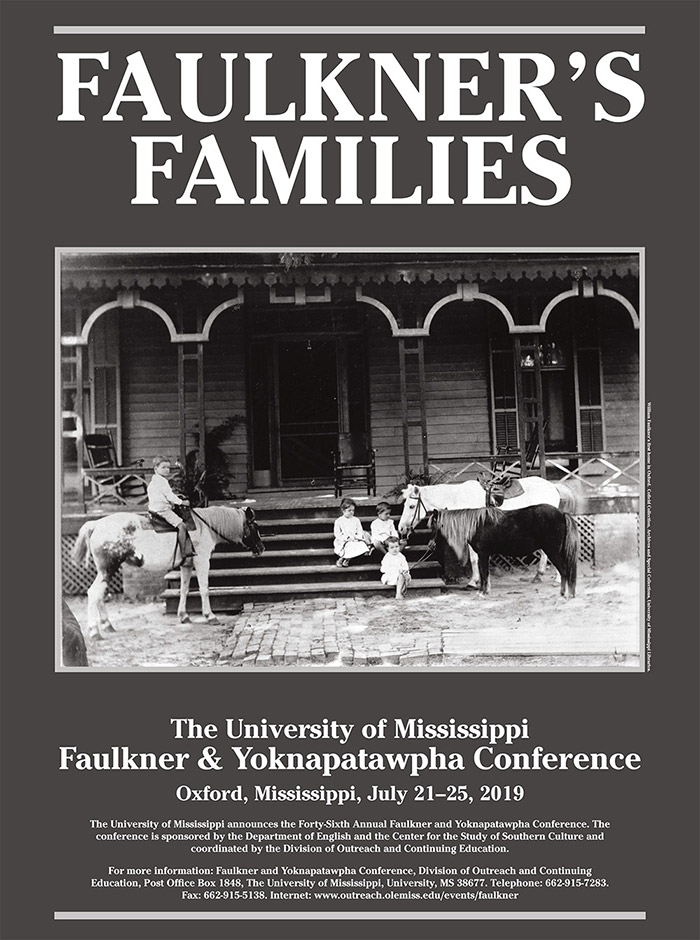
Panel. Family Beyond Fiction
Location
Nutt Auditorium
Start Date
24-7-2019 8:00 AM
Description
- The Bundren Family in Space: Adapting As I Lay Dying for the Stage / Tyler Mercer and Chris Dieman, Live Source Theater Group; Elizabeth Cornell, Fordham University
- “The Family of Man”: William Faulkner and U. S. Public Diplomacy in Postwar Japan / Yuko Yamamoto, Chiba University
The Family of Man, a photographic exhibition curated by Edward Steichen, toured worldwide between 1955 and 1962; William Faulkner traveled to Latin America, Asia, and Europe as a cultural ambassador between 1954 and 1961. Faulkner arrived in Tokyo, Japan, on August 1, 1955 and starred in the documentary film, Impressions of Japan (1955), created by the United States Information Service (USIS). Commissioned by the USIS, The Family of Man opened in Tokyo on March 21, 1956. My paper considers the film and the exhibition, both successful USIS-sponsored activities in Japan, within the context of U. S. public diplomacy in Japan around the year 1955, especially in relation to the Atoms for Peace campaign. What emerges from situating the film and the exhibition in this context is that, in the postwar Cold War era, Faulkner himself became an official spokesperson for “the Family of Man.” - Coming of Age with John Williams’ Music in The Reivers / Mariana Sonntag Whitmer
Before delighting audiences with his well-known music for the Harry Potter, Star Wars, and Indiana Jones franchises, John Williams wrote music for small (mostly TV) projects and low-level dramas. The opportunity to compose the music for the filmic interpretation of Faulkner’s The Reivers in 1969 proved to be career-changing. My presentation examines how Williams musically enhances our understanding of Lucius McCaslin’s experiences as they lead him to a new level of maturity. Interwoven amongst a fabric of American musical idioms, distinct sets of musical materials guide the audience through Lucius’ internal musings as he struggles with the enticement of disobedience. Even the popular songs heard throughout the film point to the careful consideration accorded the film’s musical accompaniment, as it enhances our understanding of the narrative. Ultimately, it was Faulkner’s novel that stimulated Williams to craft this important score which launched his musical career.
Relational Format
Conference proceeding
Recommended Citation
Mercer, Tyler; Dieman, Chris; Yamamoto, Yuko; and Whitmer, Mariana Sonntag, "Panel. Family Beyond Fiction" (2019). Faulkner and Yoknapatawpha Conference. 21.
https://egrove.olemiss.edu/fy/2019/schedule/21
COinS
Jul 24th, 8:00 AM
Panel. Family Beyond Fiction
Nutt Auditorium
- The Bundren Family in Space: Adapting As I Lay Dying for the Stage / Tyler Mercer and Chris Dieman, Live Source Theater Group; Elizabeth Cornell, Fordham University
- “The Family of Man”: William Faulkner and U. S. Public Diplomacy in Postwar Japan / Yuko Yamamoto, Chiba University
The Family of Man, a photographic exhibition curated by Edward Steichen, toured worldwide between 1955 and 1962; William Faulkner traveled to Latin America, Asia, and Europe as a cultural ambassador between 1954 and 1961. Faulkner arrived in Tokyo, Japan, on August 1, 1955 and starred in the documentary film, Impressions of Japan (1955), created by the United States Information Service (USIS). Commissioned by the USIS, The Family of Man opened in Tokyo on March 21, 1956. My paper considers the film and the exhibition, both successful USIS-sponsored activities in Japan, within the context of U. S. public diplomacy in Japan around the year 1955, especially in relation to the Atoms for Peace campaign. What emerges from situating the film and the exhibition in this context is that, in the postwar Cold War era, Faulkner himself became an official spokesperson for “the Family of Man.” - Coming of Age with John Williams’ Music in The Reivers / Mariana Sonntag Whitmer
Before delighting audiences with his well-known music for the Harry Potter, Star Wars, and Indiana Jones franchises, John Williams wrote music for small (mostly TV) projects and low-level dramas. The opportunity to compose the music for the filmic interpretation of Faulkner’s The Reivers in 1969 proved to be career-changing. My presentation examines how Williams musically enhances our understanding of Lucius McCaslin’s experiences as they lead him to a new level of maturity. Interwoven amongst a fabric of American musical idioms, distinct sets of musical materials guide the audience through Lucius’ internal musings as he struggles with the enticement of disobedience. Even the popular songs heard throughout the film point to the careful consideration accorded the film’s musical accompaniment, as it enhances our understanding of the narrative. Ultimately, it was Faulkner’s novel that stimulated Williams to craft this important score which launched his musical career.

